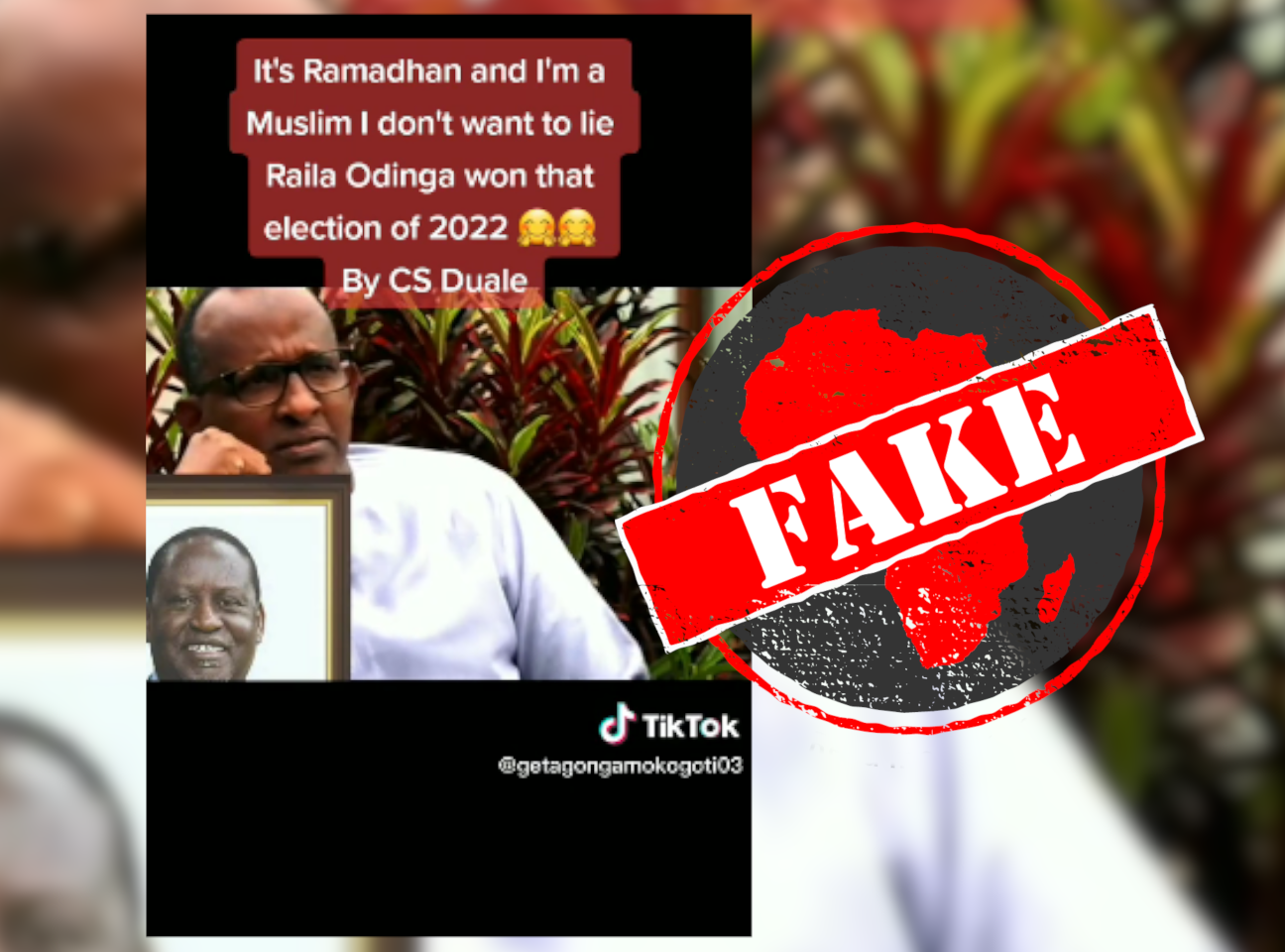IN SHORT: A clip is circulating online with the claim it shows Kenyan defence minister Aden Duale admitting that veteran opposition leader Raila Odinga won the 2022 general election. But this isn’t true – the clip has been edited to change what the minister said.
A video circulating on Tiktok and Facebook appears to show Kenya’s defence minister Aden Duale admitting that opposition leader Raila Odinga won the country’s 2022 presidential vote.
The 20-second clip shows Duale being interviewed. The minister says: “And I’m a Muslim. I don’t want to lie. Raila Odinga won that election of two thousand and [unintelligible]. Through the action of IEBC. The difference was about 200,000 votes when really proper tallying was done. But you can win … [unintelligible] … the constitution. The 50+1 margin ...”
The video is titled: “It’s Ramadhan and I’m a Muslim I don’t want to lie. Raila Odinga won that election of 2022. By CS Duale.”
It has been shared over 5,000 times, liked over 30,000 times, and received over 900 comments. It seems that the video was made during the Muslim holy month of Ramadan, which was from 23 March to 21 April in 2023.
President William Ruto beat Odinga by about 233,000 votes, according to Kenya’s Independent Electoral and Boundaries Commission (IEBC) which managed the 9 August 2022 general elections.
Ruto passed the constitutional threshold of 50% plus 1 by just under 70,000 votes. The supreme court upheld Ruto’s victory and he was sworn in in September.
Odinga, who heads the Azimio La Umoja-One Kenya coalition, has said he disagreed with the supreme court ruling but respected it. He has however regularly staged street protests over the issue and other grievances.
Duale is a member of Ruto's ruling United Democratic Alliance. It would therefore be newsworthy if he claimed that Odinga won the election instead of his party leader.
Did the minister make this statement? We checked.

Clever editing of longer video backs up false claim
A Google search of some of the key phrases in the video leads to a longer video with similar phrases and context. This video is available on both Facebook and YouTube.
Africa Check found that the shorter TikTok video was created entirely from the parts of the longer video where the minister speaks. The TikTok video is made up of four cuts. The first cut is from minute 34:49 to 34:56. The second is from minute 36:48 to 46:32. The third is from minute 34:32 to 34:41, and the final cut is from minute 34:43 to 34:46.
The longer video was uploaded on YouTube on 28 September 2021. It contains interviews with senior politicians talking about major political events in the country over the years.
In the original video, Duale was talking about the 2007 elections. But the TikTok video has been edited to make it look like he was talking about the 2022 elections.The part where he refers to 2007 has been removed.
In addition, certain parts have been added, such as Duale's mention of the IEBC, which we could not find in the older video, and his statement about a 200,000-vote difference, a figure similar to the margin of victory in the 2022 elections.
These manipulative edits and the caption help to make this false claim seem true.
Republish our content for free
For publishers: what to do if your post is rated false
A fact-checker has rated your Facebook or Instagram post as “false”, “altered”, “partly false” or “missing context”. This could have serious consequences. What do you do?
Click on our guide for the steps you should follow.
Publishers guideAfrica Check teams up with Facebook
Africa Check is a partner in Meta's third-party fact-checking programme to help stop the spread of false information on social media.
The content we rate as “false” will be downgraded on Facebook and Instagram. This means fewer people will see it.
You can also help identify false information on Facebook. This guide explains how.





Add new comment